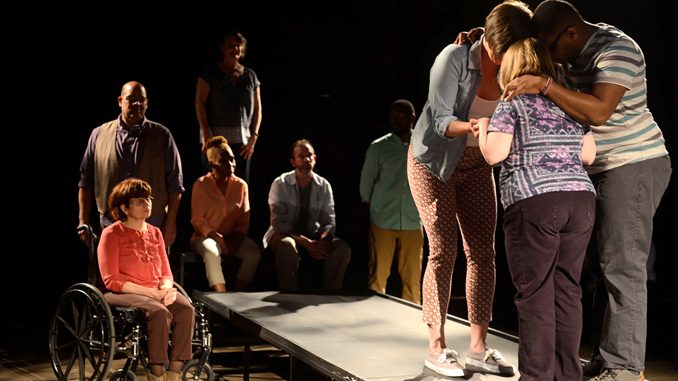
Shawn Aleong recognizes the first time he was called the “R-word” as a formative experience.
“It made me sad, but then I turned all the negatives into a positive,” Aleong said. “I took what they said and I used that to make me stronger.”
“Society picks and chooses what they want to accept,” he added. “How can we call this a great nation and a great society if we don’t include people with intellectual disabilities?”
Aleong, a sophomore pre-law major and assistant auditor general of TSG with an intellectual disability, performed in “A Fierce Kind of Love,” a play produced by Temple’s Institute on Disabilities. During the play, dialogue, dance and song are used to tell people’s stories and the history of Pennsylvania’s intellectual disabilities rights movement.
“We say the intellectual disabilities civil rights movement is a hidden history of the civil rights movement you never knew about,” said Lisa Sonneborn, the project coordinator of the Institute on Disabilities and producer of AFKOL. “We wanted to preserve it before we lost it.”
“If people understand the history, then maybe they can make the future better,” Aleong said. “We can make our society better if [there’s more] knowledge about people with intellectual disabilities.”
The 16-scene play was shown on the weekends during the weeks of April 3 and April 10 at Christ Church Neighborhood House, a wheelchair-accessible location in Old City. According to the church’s website, all performances of AFKOL were ASL-interpreted, CART-captioned and “sensory friendly.” These features were to ensure people with intellectual disabilities would be able to attend and enjoy the show.
Celia Feinstein, co-executive director of the Institute on Disabilities and self-proclaimed “fairy godmother” of AFKOL, said the goal of the play was to attract “a non-traditional audience,” meaning people not usually involved in the disability community, to increase awareness and understanding of the disability community.
“This play tells the truth and the whole truth,” Aleong said.
AFKOL had a mixed-ability cast, made up of four actors who have intellectual disabilities and five professional actors who do not. Watching the mixed-ability cast interact was one of the most memorable parts of the show, Feinstein said.
“I think it forever changed the way the professional actors do their craft,” Feinstein said. “It’s given them a new sensitivity. I think it’s just made them better actors.”
“It’s given the actors with intellectual disabilities exposure to a world they didn’t know existed,” she added. “The world of theater is new to them as a form for telling their stories through movement, dance and dialogue.”
AFKOL is essential for the goals of Visionary Voices, a program for the Institute on Disabilities which Sonneborn also produced. Visionary Voices aims to tell the story of Pennsylvania’s intellectual disabilities rights movement through interviews with the movement’s leaders, archival presentation and other mediums.
The content of Visionary Voices served as inspiration for Sonneborn, director David Bradley and playwright Suli Holum as they created AFKOL. Scenes in the play focus on real families of people with intellectual disabilities and their roles in the movement, which Visionary Voices has also chronicled.
Though the play told the stories of a historical movement, it simultaneously highlighted the struggles of people with intellectual disabilities today.
“My mom had to make sure I was treated equally,” Aleong said. “When I was real young, my mom had to fight the school board to get me the proper education. My mom came over at the end of the play and told me she saw every struggle that she went through in this play.”
Aleong played Roland Johnson, a man who had an intellectual disability and was the leader of the organization Speaking for Ourselves, which promotes self-advocacy for those with intellectual disabilities, before he died in 1994.
During the play, Johnson often experiences others doubting him because of his intellectual disability. Aleong said this is a struggle he has experienced in his own life, too. To Aleong, the play was an opportunity to show that people with intellectual disabilities are capable of accomplishing the same feats as people without these disabilities.
“I know I can do anything if I set my mind to it,” he said.
All eight showings of the play were sold out, and some were booked weeks in advance.
Aleong described his overall experience with AFKOL and the media’s response in one word.
“Amazing.”
Grace Shallow can be reached at grace.shallow@temple.edu or on Twitter @Grace_Shallow.


Be the first to comment